Headed to the party capital of the world? Don’t lace up your rave shoes just yet—we’ve got some safety lessons to cover first.
Ibiza is generally considered a safe place to visit, but it’s always wise to be prepared.
We’ll talk about everything you need to know—from common crimes and beach safety to potential natural disasters. Plus, we’ll share tips on navigating the climate, the best times to visit, safety precautions, and much more.
Is Ibiza Safe?
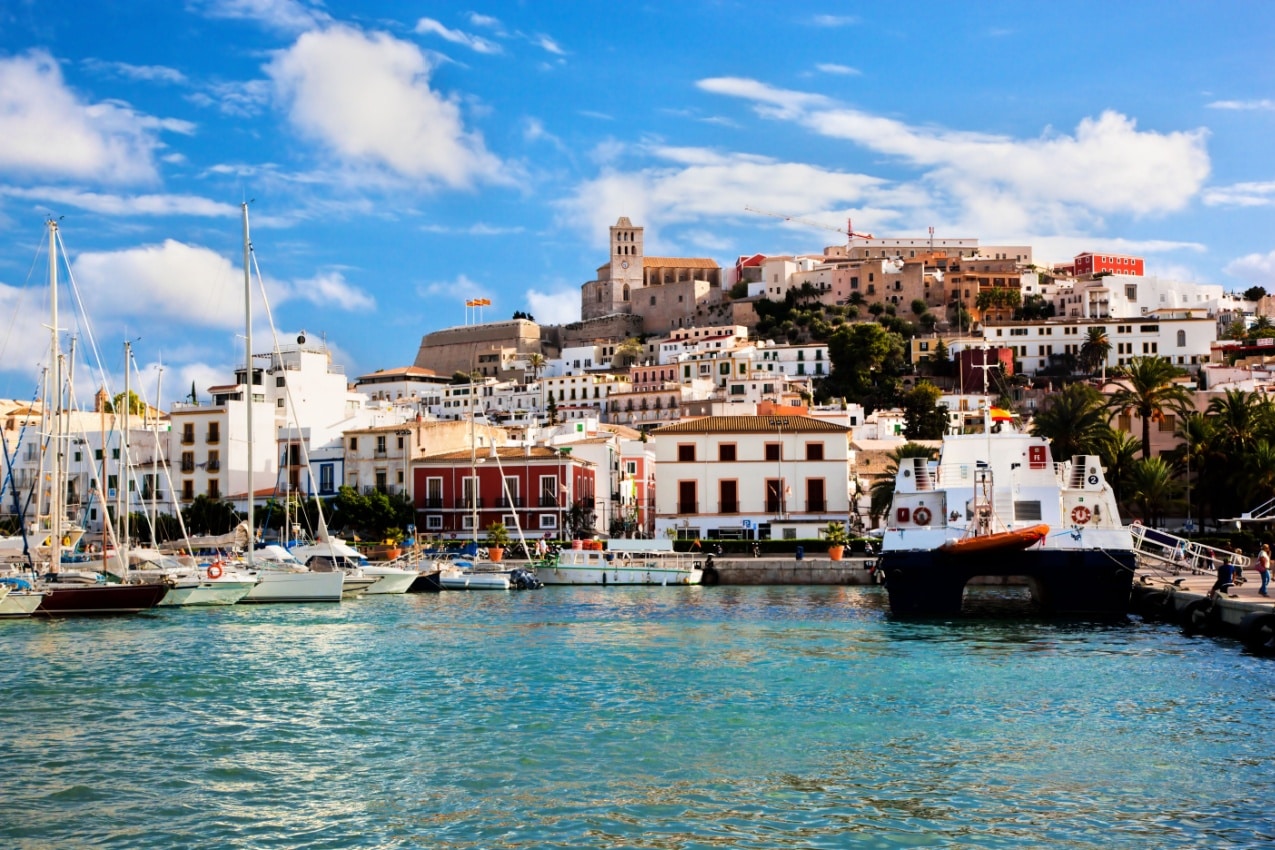
When it comes to safety, Ibiza generally ticks all the boxes. But to ensure you have the best time, there are a couple of things to watch out for..
For instance, many people come to Ibiza to party and only party, so it’s common to see alcohol and illegal substances being consumed around club areas. While most partygoers are just there to have a good time, others might get a bit reckless.
If you’re here for the party scene, enjoy substances safely and in moderation.. At the same time, be respectful to both your fellow visitors and, most importantly, the locals—after all, this is their home!
Another important aspect to consider is safeguarding your belongings. Pickpocketing is a common concern in tourist hotspots like Ibiza, so keep your essentials close at hand. Additionally, try not to overindulge in alcohol to the point where you might leave your belongings unattended!
In short, these are the key precautions to keep in mind. But stay tuned for more detailed advice to follow.
- Travel advisory for Spain: Level 2, Exercise Increased Caution
- Most common crime: Theft
- High-crime areas: Sant Antoni de Portmany, Platja d’en Bossa, San Rafael, and Ibiza Town
- Public transportation safety: Generally safe and efficient
- Road safety: The roads are well maintained with clear signage all around the island
- Safety walking alone during the day: Very safe
- Safety walking alone during the night: Moderately safe
- Family safety: The island is a great family destination, just make sure you don’t book your stay in the party areas
- Beach safety: Coastal areas are safe and clean, with lifeguards on duty
- Common natural disasters: Storms, flash floods, wildfires, earthquakes, and tsunamis
- Carbon monoxide poisoning: No recent incidents
- Police presence: High presence of police and security personnel
- Medical care quality: Great healthcare services (public hospitals offer free medical treatment for EU citizens)
Travel Advisory for Spain
The U.S. State Department has placed Spain at the Level 2 Safety Category: Exercise Increased Caution.
The advisory warns travelers about the general threat of terrorism in Spain. The island of Ibiza, luckily, being small and politically insignificant, is not typically a target for terrorist attacks.
What is more likely to occur in Ibiza are protests. Most of them are peaceful, but there’s always a risk of escalation into violence. The last protest in Ibiza occurred in July of 2023, when environmentalists rallied for a better response to climate change.
As we mentioned, pickpocketing is a bit of a nuisance in touristy spots like Ibiza. So keep your belongings close, as you would on any other trip, and you should be fine.
Lastly, the travel advisories ask visitors to have fun responsibly. Ibiza’s nightlife is legendary, but remember to keep yourself in check. The island has suffered incidents involving jumps from balconies, cliff dives, and late-night swims gone wrong due to overindulgence. So, enjoy yourself, but do so responsibly!
A Comprehensive Look at Ibiza Crime Rates
Ibiza leads the Balearic Islands in criminal incidences, with approximately 79 per 1,000 people—which is not surprising given that it is the world’s party capital.
The good news is that the majority of crimes are non-violent, mainly centered around theft and the party scene—where there’s quite a super demand for illegal substances.
The organized criminal groups mainly operate in popular nightlife areas, like Sant Antoni de Portmany, Platja d’en Bossa, San Rafael, and Ibiza Town. Luckily, you’re unlikely to get physically harmed by them and it’s easy to dodge them—keep your valuables close and don’t consume illegal substances.
Overall, don’t worry! You’ll be vacationing in the 32nd most peaceful country in the world. Spain has even earned a spot on Forbes’ 2022 list of the safest places to visit. The Spanish Ministry of Interior offers more promising news, stating that crime rates have been on the decline since 2019.
| Safety Concerns | Crime Rate | Status |
| Overall Crime Level | 48.59 | Moderate |
| Home Break-Ins and Thefts | 49.34 | Moderate |
| Mugging and Robbery | 45.77 | Moderate |
| Car Theft | 32.91 | Low |
| Theft from Vehicles | 50.77 | Moderate |
| Personal Attacks | 35.05 | Low |
| Verbal Insults | 34.38 | Low |
| Racial, Ethnic, Gender, or Religious-Based Attacks | 13.28 | Very Low |
| Drug Use and Dealing | 56.06 | Moderate |
| Property Crimes (Vandalism and Theft) | 52.91 | Moderate |
| Violent Crimes (Assault and Armed Robbery) | 37.20 | Low |
| Corruption and Bribery | 53.79 | Moderate |
| Safety Walking Alone in Daylight | 80.05 | Very High |
| Safety Walking Alone at Nighttime | 50.05 | Moderate |
Source: Numbeo, 2024 data based on 35 contributors.
Personal Crime in Ibiza
According to Numbeo, personal crimes are relatively rare in Ibiza, meaning the chances of encountering harm, injury, or threats during your vacation are very low.
Of course, this largely depends on how well you practice responsible vacationing. For instance, steer clear of situations that could be dangerous—such as conflicts at bars or at parties.
Numbeo also reveals that walking alone during the daylight is rated as ‘very safe,’ so you shouldn’t feel threatened when you’re solo vacationing. However, as with any place, keep your wits about you at night as Ibiza is ‘moderately safe’ after the sun goes down.
Property Crime in Ibiza
The most common property crime in Ibiza is pickpocketing and stealing valuables from villas.
This makes sense for any tourist hotspot—the more tourists there are, the easier it is for thieves to operate unnoticed. And when vacation rentals sit empty for most of the day (and night), they become easy targets for breaking and entering.
However, the good thing is that in the majority of instances, you can avoid such crimes as long as you are cautious.
For example, have someone from your group stay with your belongings while you take a dip. Ask someone to watch your bag while you run to the bathroom.
And you wouldn’t believe how many times villa windows are left wide open or doors unlocked. Just a few simple precautions—like keeping windows shut and doors locked—can go a long way in ensuring a stress-free vacation.
Police Presence in Ibiza
Popular tourist spots in Ibiza are regularly patrolled by police officers.
If you’re hitting the clubs—expect to see plenty of policemen and security guards. Before entering, it’s standard procedure to undergo checks for any illegal substances, alcohol, or weapons to ensure everyone’s safety.
The Spanish Government implemented “Operation Safe Summer”, where foreign police officers have been brought in to join patrols in Ibiza and assist with incidents involving tourists from other countries.
For example, in the municipality of Santa Eularia, they’ve welcomed officers from the Italian Carabinieri and the German Polizei to bolster local patrols.
The policemen and security guards are known to be friendly and approachable, as long as you show respect and abide by the law. So, relax and enjoy your time in Ibiza knowing that you’re well looked after.
Public Transportation Safety in Ibiza
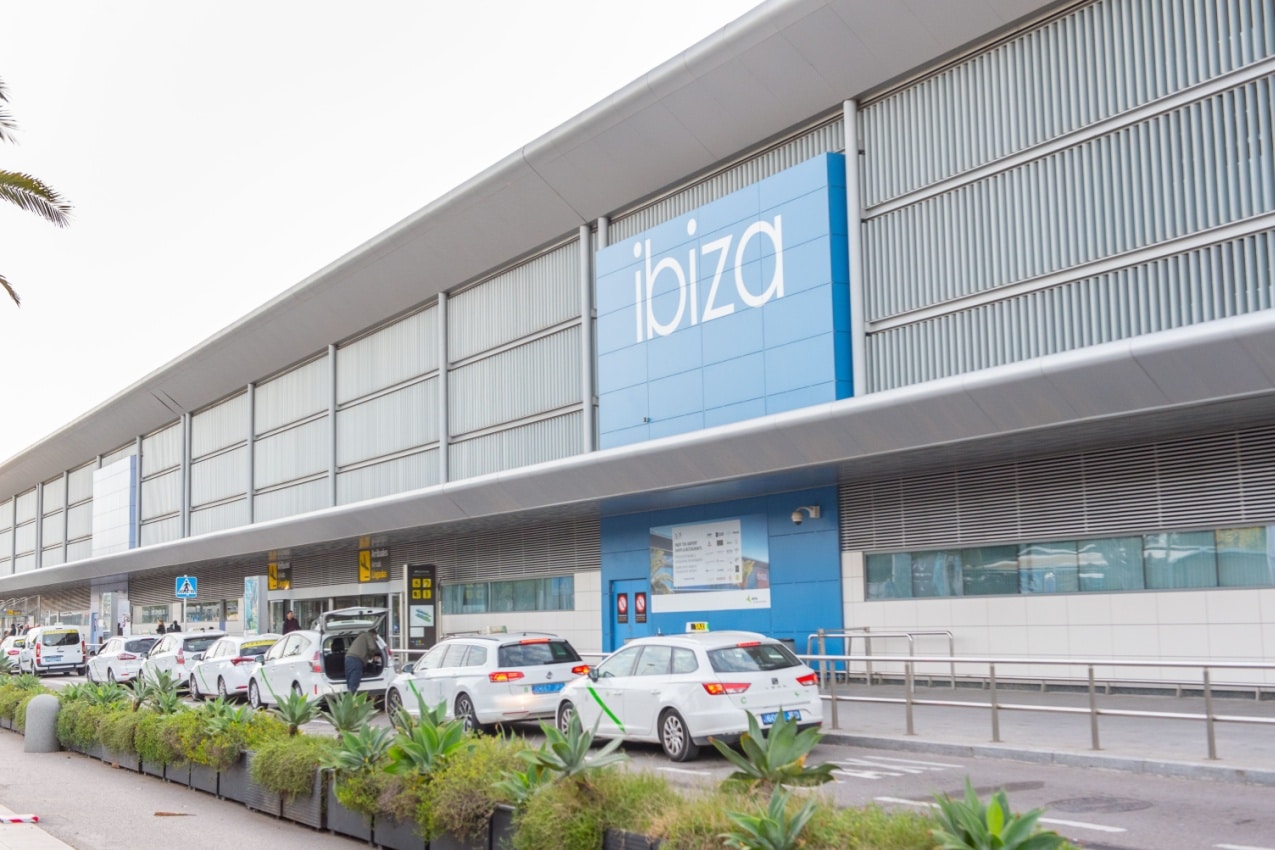
Public transportation in Ibiza is generally safe and convenient.
The island’s bus system covers most major tourist spots and quiet villages. Buses are modern, clean, and air conditioned.
Taxis are easy to find, either at stands or by hailing them on the street. They are regulated and have fixed fares. You can also call an Uber—its services are available in the club areas of Ibiza Town, San Antonio, and Santa Eulalia.
However, be aware of surge pricing when using taxis, especially during peak party times during the summer months. To avoid surprises, check the fare estimate before confirming your ride.
Road Safety in Ibiza
Driving in Ibiza is generally safe. The roads are well-maintained and there’s clear signage all around the island.
But before hitting the road, remember to:
- Stick to the speed limits, typically around 80 km/h (50mph).
- Be cautious on winding roads and steep hills, especially in rural areas.
- Stay alert for sudden lane changes and maneuvers by other drivers.
- Keep an eye out for mopeds and scooters, popular modes of transportation on the island.
- Never drink and drive! The legal blood alcohol limit in Spain is 0.5 g/l, but it’s safest to avoid driving after drinking any alcohol.
Medical Care Quality in Ibiza
In Ibiza, both partying and prioritizing health and wellness are equally important.
Some of the most well-respected public hospitals in Ibiza include:
- Hospital Can Misses (+34 971 39 70 00)
- Centre de Salut de Vila (+34 971 19 51 40)
- Centre de Salut de Sant Josep de Sa Talaia (+34 971 80 10 77)
- Centre de Salut San Antoni de Portmany (+34 971 19 58 50)
And for private care, we recommend:
- Clínica Vila Parc (+34 971 30 23 54)
- Policlínica Nuestra Señora del Rosario (+34 971 30 23 54)
Healthcare professionals in Ibiza speak various languages, from English and Spanish to German and French, making communication easy for visitors from all around the world.
EU residents can receive free treatment at public hospitals with their European Health Insurance Card, while private medical services require payment, which can often be reimbursed through medical travel insurance.
Finally, you can find 24-hour pharmacies. Just make sure to visit a “Farmacia” for conventional medicine, not a “Parafarmacia” which specializes in herbal remedies!
Is It Safe to Travel Solo in Ibiza?
Ibiza is generally safe for solo tourists.
First off, the locals here are incredibly friendly and helpful. Whether you need directions or just some good company, you can always rely on the locals to point you in the right direction and share a friendly chat.
Then, there are the tourists. The Balearic Islands where Ibiza sits receive more than 14 million visitors each year, so you’re bound to meet fellow travelers. Whether you’re dancing until sunrise at a beach rave or simply lounging on the sand, you’ll find friendly faces to elevate your solo experience and add to your sense of security.
As a solo traveler, you can also take advantage of the many group tours and activities Ibiza has to offer. We recommend the walking tours of Ibiza Town and the street art tour in Sant Antoni—all for free! And when you’re feeling adventurous, you can join a paddle surf tour to North Ibiza or hop on a guided jet-ski excursion. The options are endless.
But hey, remember to practice the safety tips we keep reminding you of. Keep an eye on your belongings and avoid wandering into unfamiliar areas late at night, especially if you are a solo female traveler!
Is it Safe to Travel to Ibiza as a Family?
Ibiza is generally a safe getaway for families.
But when planning a family holiday in Ibiza, it’s essential to book your stay in the right area—which is away from the hustle and bustle of the party scene.
We recommend the peaceful town of Santa Eulalia. Here, you’ll discover tranquil beaches, delectable dining options, vibrant markets, the UNESCO World Heritage Site Dalt Vila, and numerous family-friendly resorts, hotels, and villas.
Plus, there are tons of activities to keep the whole family entertained and happy. Younger children, for instance, can spend their days enjoying poolside fun and water parks. Older kids, on the other hand, can participate in cycling, hiking, or yoga. And the best part—many resorts offer professional childcare, giving parents the chance to relax and unwind knowing their little ones are in good hands.
Perils of Nature: The Risk of Natural Disasters in Ibiza
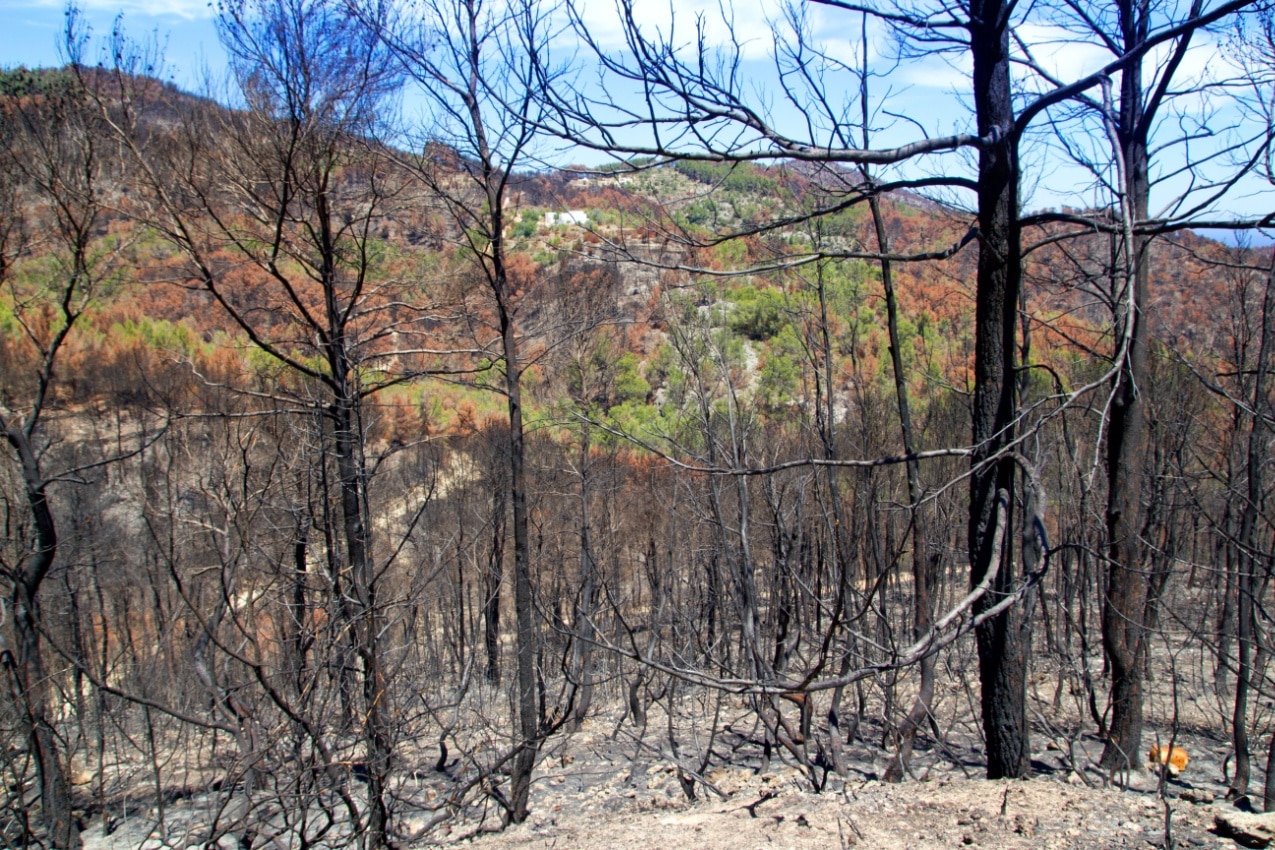
Ibiza is susceptible to a range of natural hazards, from storms and wildfires to earthquakes and even tsunamis.
Don’t worry too much, though, such events are very rare in Ibiza. However, it’s always better to be safe (and well-informed) than sorry.
Storms
Ibiza may experience severe storms, including thunderstorms, heavy rainfall, and strong winds.
The good news is that these storms are rare during the peak summer months when most tourists visit. Rainy days are more common from mid-autumn through to spring.
However, it’s worth noting that even though such storms are infrequent, they can still pack a punch when they do occur. For instance, in April 2023, Ibiza was hit by a storm that caused coastal flooding, falling branches, rockslides, and temporary closures of ports. And in 2019, a powerful tornado left three people injured.
Stormy weather would really be a bummer in Ibiza. So plan wisely—check out real-time updates on sites like ZoomEarth. If severe rain is on the horizon during your planned trip, maybe consider rescheduling for sunnier days.
Wildfires
Ibiza is susceptible to fires during the hot summer months.
These wildfires can spread fast, especially in wooded areas or places with dry vegetation. In the summer of 2023, Spain’s meteorological agency AEMET put Ibiza at “extreme” risk—but thankfully, the island has been lucky to avoid any blazes.
The most significant wildfire happened back in May of 2011 in the Valley of Morna. Nearly 2,000 hectares of forest went up in flames, forcing 230 people to evacuate and damaging 18 homes.
To prevent triggering such disasters, it is strictly prohibited to light fires in mountains, forests, or rural areas between May and October. But if you ever spot a forest fire, call 112 right away for further assistance. If you read about a wildfire warning for Ibiza before your trip, it’s probably best to postpone your visit dates.
Earthquakes
Ibiza is situated in a seismically active area, but earthquakes here are very low in magnitude and incredibly rare.
The last earthquake happened on December 16, 2023, and it was a tiny blip on the Richter scale, registering at just 2.4. Before that, there was a tremor in April with a magnitude of 2.2.
So, unless you’re at a rave with a heavy bass shaking the ground, you’re unlikely to witness a real earthquake in Ibiza. In case you do, however, remember these three things:
- Drop to the ground
- Take cover under something sturdy
- Hold on until the shaking stops
Tsunamis
Tsunamis can occur in the Mediterranean Sea— however, since they’re primarily caused by underwater earthquakes, the tremors in Ibiza don’t pack enough punch to set off such destruction.
So, you don’t need to worry about a tsunami hitting Ibiza during your stay.
If you do feel a major earthquake during your stay and happen to be near the coast, keep an eye out for any unusual water movements. If you notice the water pulling back from the coast, that’s a telltale sign of a tsunami approaching.
In that case, don’t wait around—move away from the coastal area and head for higher ground.
Beware the Silent Threat: Carbon Monoxide Poisoning in Ibiza
Ibiza has been fortunate to avoid any cases of carbon monoxide poisoning. However, recent incidents in other locations, like the Bahamas and Mexico City, have raised awareness about this toxic gas.
Carbon monoxide, or CO, is a gas that’s highly poisonous, colorless, and odorless, putting people at risk of exposure without them ever realizing it. CO may leak from faulty or poorly ventilated appliances, such as water heaters.
While a leak can be fatal, there are some precautions you can take. The main one is using CO detectors. These devices sound an alarm when dangerous CO levels are detected, potentially saving lives.
So, when booking your stay in Ibiza, it’s a good idea to check whether such protection is available at your intended lodgings. Feel free to reach out to the staff if you’re unsure.
If not, there are portable CO detectors available on the market that you can buy for yourself—they are budget-friendly, compact, and offer an extra layer of protection wherever you travel.
Another precaution is to know the early symptoms of CO poisoning, which usually include headaches, nausea, dizziness, and vomiting. If you experience any of these symptoms, seek medical attention immediately!
Serenity by the Shore: The Safety of Ibiza Beaches
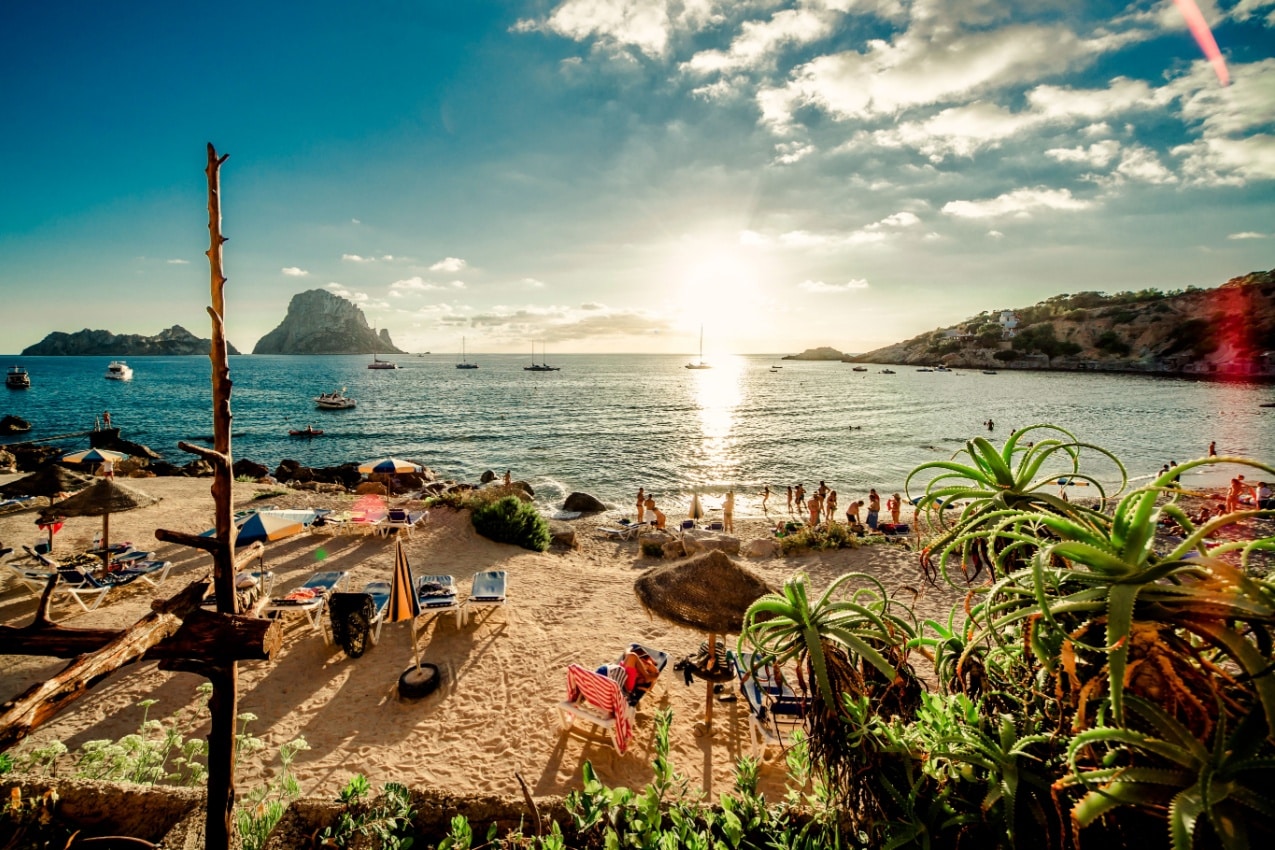
Ibiza boasts some of the finest beaches in the world—safe, clean, beautiful, and inviting.
Eight beaches in Ibiza hold the Blue Flag status, the gold standard for cleanliness, safety, and environmental protection. They’re found in the districts of Sant Joan de Labritja, (Arenal Gran Portinatx, Benirràs, and Cala San Vicente) and Santa Eulária des Riu (Cala Llenya, Cala Llonga, Es Canar, and Es Figueral).
Lifeguard services are up and running on most shores and there are large signs with information at the entrance of almost every beach, providing general information about the area, facilities offered, and details about local flora and fauna.
Ibiza uses beach warning flags, too—the multi-colored guides to swimming conditions:
- Green flag means calm waters, perfect for a dip
- Yellow flag signals slightly turbulent waters, so swim with caution
- Red flag indicates dangerous currents and waves—stay out of the water
- Black flag warns of contaminated waters
- Purple flag means that dangerous marine life is present
Shark sightings on Ibiza’s beaches are very rare, mostly because sharks avoid coasts flocked with swimmers. However, quieter spots have seen peaceful visits from these creatures, with no incidents.
Ultimately, your beach safety boils down to personal responsibility. If you’ve had a few too many drinks, it’s best to skip the swim. And as always, keep an eye on your valuables!
Ibiza Weather Patterns: What to Expect
In Ibiza, you can expect a classic Mediterranean climate, which means long, hot summers and short, mild winters.
Throughout the year, temperatures typically range from 47°F to 86°F (about 8.3°C to 30°C), with rare dips below 40°F or peaks above 89°F (about 4.4°C or 31.7°C).
August is the hottest month, with average highs of around 85°F (about 29.4°C) and lows of around 72°F (about 22.2°C), while January is the coldest, with lows averaging 47°F (about 8.3°C) and highs around 59°F (about 15°C).
Summertime is the golden period for sunshine, especially from June through early September. July is the sunniest month, with clear skies about 89% of the time. Plus, summer is the dry season, with July seeing only around 0.2 inches of rainfall (about 0.5 centimeters) on average.
However, the rest of the year does see some cloud cover and rain. October tends to be the cloudiest month, with the sky being mostly cloudy about 44% of the time. November is the rainiest, averaging 7.5 rainy days and 2.3 inches of rainfall (about 5.8 centimeters).
June has the most daylight in Ibiza, with 14 hours and 54 minutes of sunlight. Conversely, December sees the shortest days, with about 9 and a half hours of daylight.
And if you’re keen on hitting the beach, aim for July through September for warmer waters, with August boasting the highest average temperature of 79°F (about 26.1°C). Conversely, February dips to the coolest water temperatures, averaging around 57°F (about 13.9°C).
Monthly Average Temperatures in Ibiza
| Month | Fahrenheit (°F) | Celsius (°C) |
| January | 53 | 11.6 |
| February | 54 | 12.2 |
| March | 56 | 13.3 |
| April | 60 | 15.5 |
| May | 65 | 18.3 |
| June | 73 | 22.7 |
| July | 78 | 25.5 |
| August | 79 | 26.1 |
| September | 75 | 23.8 |
| October | 68 | 20 |
| November | 61 | 16.1 |
| December | 55 | 12.7 |
Source: WeatherSpark, 2024 data
When Is the Best Time to Visit Ibiza?
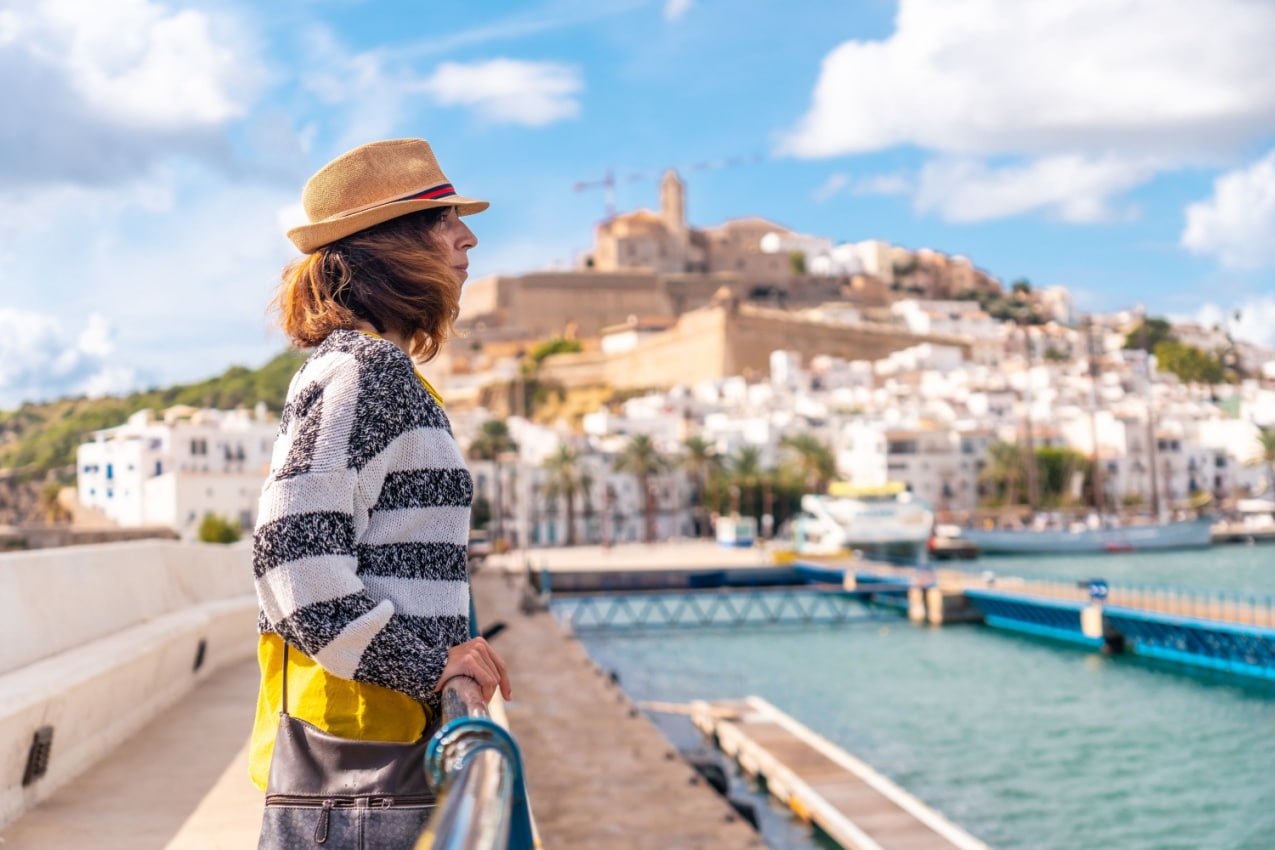
The best time to visit Ibiza depends on what you want from your holiday.
For hardcore clubbers looking for the wildest party scene, July and August are your months. That’s when the clubs are buzzing with big parties every night.
If you prefer a calmer vibe or have a favorite DJ in mind, aim for September and October for the closing parties. It’s more relaxed, and you might catch some epic send-offs.
Outdoor enthusiasts and wellness seekers should come when the clubs are closed, from November to April. It’s cheaper, quieter, and the weather is more bearable for activities like hiking. Plus, you’ll get a taste of local life.
But hey, families and those seeking a relaxed vacation can still enjoy Ibiza during the party season. You just need to book your stay at the more secluded coves and visit the quieter beaches in the northeast, like Playa Cala Xarraca or Playa de La Cueva De Portinatx. Club nights start late, so you can escape the heat and still have a peaceful time.
Essential Tips for Staying Safe
- Keep yourself informed about the current terrorist alert level in Spain—check out the Spanish Interior Ministry’s website.
- Be careful with your valuables. Leave your passport and other important documents in a secure spot, like a hotel safe, and carry photocopies instead.
- Watch out for distraction techniques—some thieves might spill something on you to create a diversion while they pick your pockets.
- Be cautious if someone claiming to be a police officer approaches you. Only show your ID, not your wallet or other valuables.
- While tap water in Ibiza is generally safe to drink, it might have a peculiar taste due to its high mineral content. Opt for bottled water if the taste bothers you.
- If you’re meeting someone you’ve only connected with online, be wary of romance scams—they’re unfortunately a thing.
- If you ever feel unsafe or witness a crime, use the Alertcops аpp (Google Play/Apple) on your smartphone to notify the local police for appropriate action.
- When you’ve had a few drinks, steer clear of risky activities like swimming, diving, or climbing. Your judgment might be impaired, and safety should always come first.
- Avoid flaunting expensive jewelry or watches—it might attract unwanted attention from thieves.
- Ibiza doesn’t have any particularly dangerous areas. However, if you want to avoid the nightlife scene, steer clear of places like San Antoni de Portmany, San Rafael, Ibiza Town, and Platja d’en Bossa.
- If you’re buying club tickets or other services from third parties, don’t share your place of stay—it could signal potential thieves when your place is empty.
- Keep it light when you head to the beach—don’t bring valuables or lots of cash. Stick to the essentials like sun protection, water, snacks, and a photocopy of your passport.
- Be wary of offers for “free” drinks at bars or clubs—they might end up costing you more than you bargained for.
- Drug use is illegal in Ibiza, so prioritize your health and well-being by avoiding any illegal or risky activities.
- Do your homework before booking accommodations. Check out reviews and communicate with your host to ensure a safe and enjoyable stay.
- Remain up-to-date on the current happenings in Ibiza—read media news at Ibiza Spotlight and Diario de Ibiza.
Emergency Numbers
- Emergency Services (Ambulance, Fire, Police): 112
- Local Police: 092
- National Police: 091
- Tourist Information Office: +34 971 30 19 00
Ibiza Is as Safe as You Make It!
Ibiza is as beautiful as they say, and also pretty safe for visitors!
Aside from the occasional pickpocketing that you need to be mindful of—which happens even in the safest European countries —you’ll find yourself sunbathing during the day and dancing all night long.
When you need to take a break from the music scene, you can explore the island’s historical center with its charming white buildings or venture into the green hills to discover quaint villages and serene coves.
Every Sunday at sunset, you can also head to Berrinas Beach for a hippie ceremony where you’ll watch the sunset, dance, and join the drumming ritual with the locals and tourists.
When hunger strikes, visit Palona, the laid-back garden restaurant, or Fish Shack, the hidden gem serving fresh seafood at the end of Talamanca Beach.
And of course, don’t underestimate the importance of footwear! Comfortable and appropriate shoes are a must, whether you’re dancing until sunrise at a rave or exploring Ibiza’s natural beauty off the beaten path.
Enjoy your time in Ibiza!